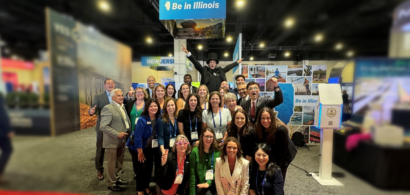Why Plant-based Innovator Primient Has Deepened Its Roots in Illinois
A leader in agriculture and innovation, Illinois has become a hub for the thriving fermentation industry.

One company that is deepening its roots in Illinois is Primient, a top producer of food and industrial ingredients made from renewable, plant-based sources – from animal nutrition to sweeteners.
A Historic Legacy Full of Plant-Based Potential
Primient’s foundations started more than 100 years ago from agricultural pioneer A.E. Staley and the Staley Manufacturing Company in Decatur, IL. As a new private company (launched April 2022), Primient has big plans.
In 2023, they extended their Illinois footprint, announcing a new, Schaumburg-based headquarters (June 2023) and an impressive $500m of planned investment across the company’s network of facilities to upgrade and renew manufacturing assets for a brighter, more sustainable plant-based future.
 The company has two offices, 11 grain elevators, and their largest most complex corn wet mill in Illinois, as well as facilities across the Midwest, Latin America, and Poland. Primient currently employs around 1,900 people.
The company has two offices, 11 grain elevators, and their largest most complex corn wet mill in Illinois, as well as facilities across the Midwest, Latin America, and Poland. Primient currently employs around 1,900 people.
Location and Partnership Make the Difference
Agribusiness companies like Primient stay and continue to invest in Illinois for a number of key reasons – for Primient, proximity to its network of farmer producers, transportation connections, and its potential to lead in the bioeconomy thanks to cutting-edge expertise and partnership close to home are key.
For example:
- The University of Illinois’ Integrated Bioprocessing Research Laboratory (IBRL) bridges the gap from basic discovery to commercialization of bioproducts.
- Led by IRBRL, the Illinois Fermentation and Agriculture Biomanufacturing Hub (iFAB) was recently designated as a U.S. Economic Development Administration Tech Hub, recognizing central Illinois as a center for biomanufacturing.
- Illinois is the largest state for employment in agricultural feedstock and industrial bioscience, according to BIO’s 2022 industry report.
- As a major center for grain processing, Illinois provides access to large volumes of high-quality, corn-derived sugar that serves as a substrate of choice for fermentation-based processes.
Eric Lee, Director, Business Development – Fermentation, Sweeteners, and Acidulants for Primient discussed how the state has supported its growth.
Q: How much has Illinois’ role as a growing biotech hub been a factor in Primient’s growth?
Federal, state, and local support for the growing bioeconomy is critical.
Primient has a proud legacy built on a pioneering and entrepreneurial spirit and we lead with that same mindset of continuous improvement as we look towards the future of sustainable practices and technologies.
 Practical solutions continue to emerge up and down the value chain that offer a cleaner and greener way to produce the products we use and love every day. We know that thinking in new ways, building the right partnerships, and blending our capabilities and rich portfolio of products is how we will pave the way.
Practical solutions continue to emerge up and down the value chain that offer a cleaner and greener way to produce the products we use and love every day. We know that thinking in new ways, building the right partnerships, and blending our capabilities and rich portfolio of products is how we will pave the way.
We are excited to be part of the growing effort to make Central Illinois a hub to foster bio-based development. Collaborating with local partners, like the Integrated Bioprocessing Research Laboratory at the University of Illinois is instrumental in the change making which supports innovative ideas to successful commercialization. Primient is uniquely positioned to support that stage gate process from idea, to lab, to pilot, and scale-up.
Q: What advice do you have for other industrial fermentation companies looking to expand or relocate?
As the bioeconomy continues to mature, companies looking to commercialize their technologies need to focus on implementing both short-term and long-term strategies.
Short-term needs typically involve confirmation that processes developed in the laboratory can be effectively scaled-up at pilot and demonstration scales. This is a critical step to ensure process efficiencies and economics will meet targets at commercial scale.
Long-term needs that are critical to success include identifying a reliable supply of high-quality substrate (sugar), which is typically the largest volume raw material and most costly consumable in a fermentation process.
Additionally, other primary inputs such as facility location, energy costs, water, logistics, available workforce, and many others must be considered. Another key driver for next generation biotechnology ventures is sustainability, most biotechnology applications are focused on delivering end products with a reduced carbon footprint that lessen impact on the environment and our communities.

Designing, building, and operating a precision fermentation facility that takes all these factors into consideration can be a barrier for market entry, so R&D teams need to weigh their options carefully as they map their path to market. Primient, as an experienced bio refiner, has a long history of success in all the areas noted above.
As a company and partner, Primient has innovated and implemented fermentation at every scale, producing a wide range of functional bio-based products for decades.
As a proven plant-based producer, we offer the full spectrum of support and expertise from raw materials and services, to scale-up and commercial fermentation assets, accelerating the pipeline of new bio-based, fermentation-derived products.
All images courtesy of Primient.
Are you ready to be where the action is? Reach out to the Intersect Illinois team to discuss properties perfectly suited for your business.
Be in touch
Are you ready to be where the action is? Reach out to the Intersect Illinois team to discuss properties perfectly suited for your business.


